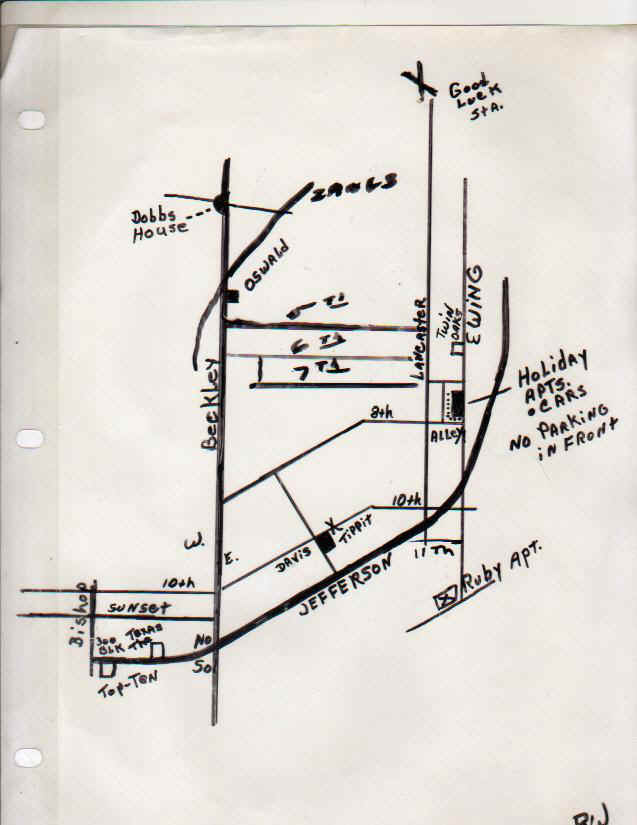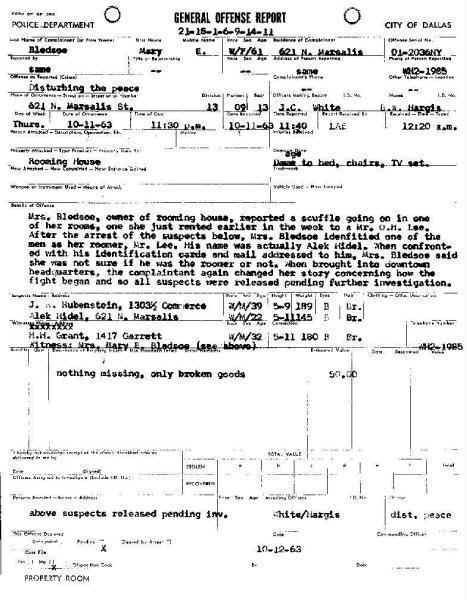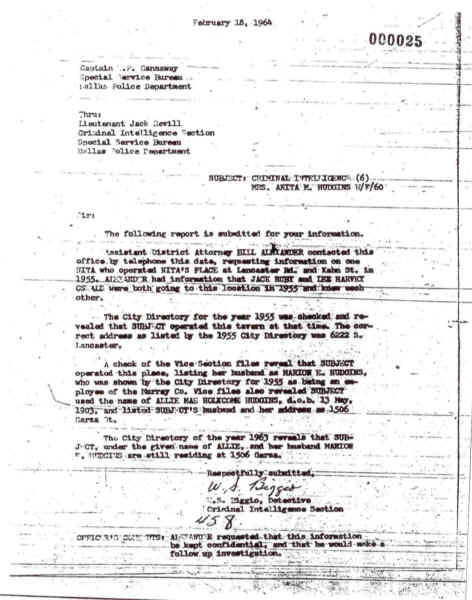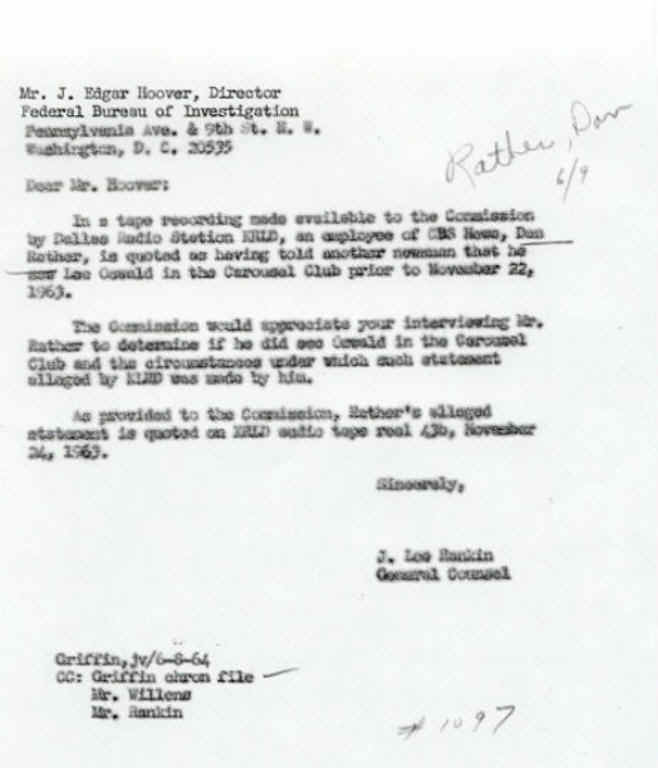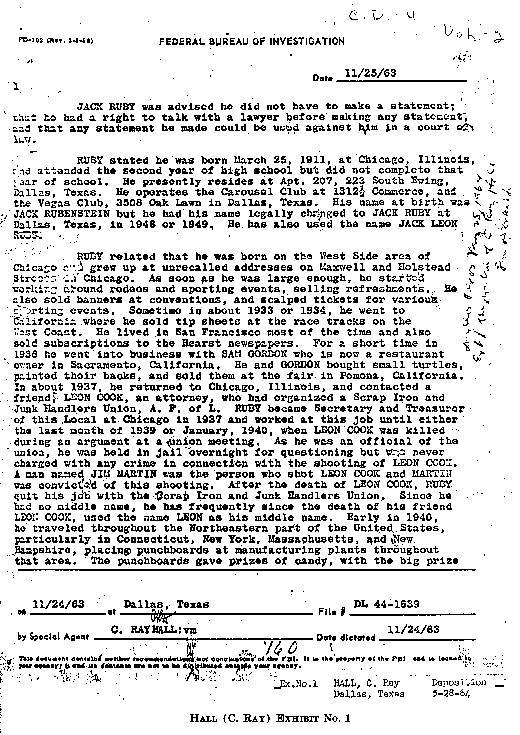
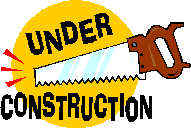
Oh Yes Jack Ruby;
What the authorities Forgot to tell us was that Jack Ruby was a.....
Dallas Police Department Informant (acc. to Dllas detectiveJames leavalle See Video page)
FBI Informant (See Video Page)
Gunrunner for the CIA (See Testimony below) Read the complete testimony Here. http://whokilledjfk.net/nancy_perrin_rich_.htm
Mr. HUBERT. Now, I am marking the Xerox copy of that document for
identification by writing on the right-hand margin the following words; to wit:
"Washington, D.C., June 2, 1964, Exhibit No. 1, Deposition of Nancy Perrin
Rich," under which I have signed my name, and in order that the record may
show that there is no misunderstanding about it, I wonder if you would sign your
name as I 'have mine.
Mrs. RICH. Yes; I would. Note for the record that on the left-hand margin I
signed "Nancy E. Perrin Rich."
344
Page 345
Mr. HUBERT. I think the letter that you handed me was in an envelope, which was
plain, other than the fact that it had in the left-hand upper corner the words
"Office of District Attorney, Room 204, Courthouse, Sacramento 14,
California" I am marking a Xerox copy of the original of that envelope,
which has been returned to you, for identification by writing on the Xerox copy
the following, to wit: "Washington, D.C., June 2, 1964, Exhibit 2,
Deposition of Nancy Perrin Rich," under which I have signed my name, and I
ask you to sign yours as you did with reference to Exhibit No. 1.
Mrs. RICH. Note for the record that I signed Nancy E. Perrin Rich under Mr.
Hubert's signature.
(The documents referred to were marked Nancy E. Perrin Rich Exhibits 1 and 2 for
identification.)
Mr. HUBERT. Thank you, ma'am.
Mrs. RICH. At this time I would also, pertaining to my statement concerning
working for various police organizations, introduce into this informal hearing,
so to speak, another piece of material given to me by the Oakland Police
Department while working on a case for them, under the name of Julie Anne Cody.
Also under this name is a police record purposely devised by the Oakland Police
Department for obvious purposes, to coincide with this card that I am about to
hand to Mr. Hubert--also, how shall we say it--falsified, made up by the Oakland
Police Department, for obvious purposes. This was to get me into a particular
place---I had to have a police record--all done with the sanction of the Oakland
Police Department. May I also note that on that card the dates and the names are
fictitious, intentionally so. The card was in reality printed in, I believe,
November of 1963.
Mr. HUBERT. You say you want to introduce this card into this proceeding?
Mrs. RICH. Yes. And I will tell you why. If you note the date on that, some of
my statements--Let's say that this came into light, and I didn't give the
explanation of why and what this meant--the dates would conflict with some of my
testimony. And I want this understood that this was purely done to, shah we say,
consummate a case for the Oakland Police Department. I was not actually in
California the dates on that card.
Mr. HUBERT. When was this card issued to you?
Mrs. RICH. In reality, this card was issued in November of 1963. I ,was working
on a grand larceny case.
Mr. HUBERT. You want this card back, the original?
Mrs. RICH. Yes.
Mr. HUBERT. All right. Now, as soon as we have a xerox copy made of the card, we
will identify it and sign the copies as we have done the other.
Meanwhile, let us pass on to another point. I think you have mentioned that you
saw Ruby at a certain meeting at which your husband was present and there was a
general discussion of guns or Cuban. refugees.
Mrs. RICH. Your statement is partially correct.
Mr. HUBERT. Will you tell us what is actually correct?
Mrs. RICH. At the first meeting there were four people present. There was a
colonel, or a light colonel, I forgot which. I also forget whether he was Air
Force or Army. It seems to me he was Army. And it seems to me he was regular
Army. There was my husband, Mr. Perrin, myself, and a fellow named Dave, and I
don't remember his last name. Dave C.--I think it was Cole, but I wouldn't be
sure.
Dave came to my husband with a proposition.
Mr. HUBERT. There were only four people present?
Mrs. RICH. Let me clarify the statement about Dave. He was a bartender for the
University Club on Commerce Street in Dallas. I became associated with him and
subsequently so did my husband. Well, at first it looked all right to me. They
wanted someone to pilot a boat---someone that knew Cuba, and my husband claimed
he did. Whether he did, I don't know. I know he did know boats. So they were
going to bring Cuban refugees out into Miami. All this was fine, because by that
time everyone knew Castro for what he appears to be, shall we say. So I said
sure, why not--$10,000. I said that is fine.
345
731-229 O---64---vol.XIV----23
Page 346
Mr. HUBERT. Do I understand from that that you and your husband were to receive
$10,000 for your services?
Mrs. RICH. Well, I was incidental.
Mr. HUBERT. No; I would like to know.
Mrs. RICH. I say I was incidental. My husband was.
Mr. HUBERT. Your husband was to receive $10,000?
Mrs. RICH. Yes.
Mr. HUBERT. Who told him so?
Mrs. RICH. The colonel.
Mr. HUBERT. Where did this meeting take place?
Mrs. RICH. In Dallas at an apartment building. Again, I can describe that darned
building to a "T" and I couldn't tell you what street it is on.
Mr. HUBERT. Would you describe it for us, please?
Mrs. RICH. Yes; it was sitting--if I may do it in diagram.
Mr. HUBERT. Do you know what section of the city it was?
Mrs. RICH. No; this I don't. You come along--let's say this is your main street,
that the apartment building set on. We have an apartment building, not setting
facing the street, but with the side towards the street. A hill slopes up. There
is a path that kind of winds around. There are flowers and gardens here; and in
them I believe there is a little fountain--and in them was lights--illuminating
the gardens; and you have to come up a little hill, and walk around--I am not
sure whether there was a gravel path or not, or whether it is flagstone and into
the building here. And it was a double deck, I believe perhaps a triple.
Mr. HUBERT. Apartment house?
Mrs. RICH. Yes.
Mr. HUBERT. How many apartments, roughly speaking?
Mrs. RICH. I could not say how many. The standard apartment building for Dallas.
Mr. HUBERT. Well, now, at this point let us do this: You have handed us the card
that you referred to in your testimony previously. We have now had a Xerox copy
made of it. I am handing you back the original. For the purpose of
identification, I am marking the Xerox copy, front and back, as follows, to wit:
"Washington, D.C., June 2, 1964, Exhibit No. 3, Deposition of Nancy Perrin
Rich," and I am signing my name below that. And on the reverse side of it,
which appears on another Xerox page, I am marking for the purpose of
identification the following: "Washington, D.C., June 2, 1964, Exhibit No.
3-A, Deposition of Nancy Perrin Rich," under which I have signed my name.
And I ask you, please, to sign both documents below my name so that the record
will show that we have been speaking of the same document.
Mrs. RICH. Note for the record that I signed Nancy E. Perrin Rich under Mr.
Hubert's name on Exhibit No. 3. Will you note for the record that I signed Nancy
E. Perrin Rich under Mr. Hubert's name on Exhibit No. 3-A.
(The documents referred to were marked Nancy Perrin Rich Exhibits Nos. 3 and 3-A
for identification.)
Mr. HUBERT. Now, a moment ago you were testifying concerning an apartment house
at which you and your husband met a colonel and another man by the name of Dave
C, I think you said.
Mrs. RICH. Yes; that is an initial--C. Dave took us there.
Mr. HUBERT. I am going to mark that document for the purpose of identification
"Washington, D.C., June 2, 1964, Exhibit No. 4, Deposition of Nancy Perrin
Rich, under which I am signing my name, and I ask you to sign your name on it,
if you please.
Mrs. RICH. I didn't mean for this to be an exhibit. Will you note for the record
that I signed Nancy E. Perrin Rich under Mr. Hubert's name on Exhibit No. 4.
Also note for the record the writing I am doing after signing is merely
designating what the lines mean.
(The document referred to was marked Nancy Perrin Rich Exhibit No. 4 for
identification.)
Mr. HUBERT. Am I correct in stating that prior to the writing you have just put
on the document, Exhibit No. 4, there were merely lines which indicated a street
and an apartment and a little path, showing a garden. And that since
346
Page 347
the document has been identified, you have written in all that appears in
handwriting?
Mrs. RICH. That is correct.
Mr. HUBERT. Do you remember on what floor this apartment was that you visited?
Mrs. RICH. I believe the first.
Mr. HUBERT. Do you remember whether it was to the left or the right as you went
in?
Mrs. RICH. There was no question of left or right as such. It was--you just
walked in. There was no hallway to indicate left or right, if that is what you
are referring to.
Mr. HUBERT. In other words, this apartment actually opened on the path?
Mrs. RICH. That is correct.
Mr. HUBERT. How many rooms did it have?
Mrs. RICH. I don't recall whether it was a one or two bedroom.
Mr. HUBERT. Can you give us any other description of the apartment building,
first of all?
Mrs. RICH. The apartment itself wasn't too well furnished.
Mr. HUBERT. Was it a brick apartment?
Mrs. RICH. I believe it was. Either brick or stucco.
Mr. HUBERT. Do you know the color of it?
Mrs. RICH. I don't. But I believe it had colored doors. Now, I could be
mistaken.
Mr. HUBERT. And the apartment itself was one or two bedrooms, and I think you
say it was not well furnished. Do you recall anything about the interior of the
apartment that would be significant?
Mrs. RICH. Let me clarify that. When I say not well furnished, I should have
said sparsely furnished. It looked like an unfurnished apartment that he had
just thrown some furniture into and not too much of it. I believe I remember he
said something about he just moved in; hadn't finished it.
Mr. HUBERT. Did it have lamps in it?
Mrs. RICH. I believe it did. I think it had one lamp on the table.
Mr. HUBERT. Do you recall anything about the furniture that was there?
Mrs. RICH. Yes; it was, I believe you call it Danish modern.
Mr. HUBERT. Was it upholstered?
Mrs. RICH. I don't recall. It was typical cheap apartment furniture. I believe
it had plastic upholstery.
Mr. HUBERT. I think you said you went there at night.
Mrs. RICH. Yes.
Mr. HUBERT. About what time?
Mrs. RICH. It was after dark. Probably 9 o'clock.
Mr. HUBERT. Do you recall how long it took you to drive from where you were
living to this place?
Mrs. RICH. No; I do not.
Mr. HUBERT. How did you get there?
Mrs. RICH. In Dave's car. Now, again, I said four people present. I should have
counted--he had a girl with him. She wasn't in it or anything, just some girl he
had along for the evening. She war never part of it. In fact, I think she stayed
in the car.
Mr. HUBERT. How long were you in the place?
Mrs. RICH. Oh, probably half an hour, 45 minutes, an hour at the most.
Mr. HUBERT. What was the general discussion?
Mrs. RICH. Feeling each other out. I just kind of sat there and listened. The
general gist of it was we were going to obtain a boat, the colonel could obtain
various things, and nothing specific was mentioned on what the various things
were at that time. And we were going to go and pick up--they were deciding where
to pick them up-pick up Cuban refugees, and bring them over to the main coast,
meaning Miami, which, quite frankly, I adhered to because at that time, as I
say, Castro is or was what we suppose him to be today, and quite frankly I had
seen underprivileged countries and at that time thought it was a good idea.
Mr. HUBERT. Was the sum of $10,000 mentioned at that meeting?
347
Page 348
Mrs. RICH. Yes; it was.
Mr. HUBERT. Who mentioned it?
Mrs. RICH. The colonel. And it seemed awfully exorbitant for something like
this. I smelled a fish, to quote a maxim.
Mr. HUBERT. You mean you thought that there was too much money involved for this
sort of operation?
Mrs. RICH. Yes; I did.
Mr. HUBERT. You didn't express that view, of course?
Mrs. RICH. No; I didn't say anything. I just kept quiet.
Mr. HUBERT. How were matters left at the end of that meeting?
Mrs. RICH. That there were more people involved, and that we were to attend a
meeting at some later date, of which we would be advised.
Mr. HUBERT. Were you advised?
Mrs. RICH. We were.
Mr. HUBERT. Did another meeting take place?
Mrs. RICH. Yes; it did.
Mr. HUBERT. How long after the first?
Mrs. RICH. Oh, probably 5 or 6 days, give or take a day or 2.
Mr. HUBERT. At the same place?
Mrs. RICH. Yes.
Mr. HUBERT. Was it at night?
Mrs. RICH. It was.
Mr. HUBERT. How did you get there then?
Mrs. RICH. We went in our own car, but with Dave with us. At that time, Dave and
my husband and I were in our car.
Mr. HUBERT. All right. Tell us what happened.
Mrs. RICH. Well, we got there and at that time there was the colonel and another
middle-aged woman, kind of a real old granite face I would describe her,
steel-gray hair. Looked rather mannish. And there was a rather----
Mr. HUBERT. Did you know her name?
Mrs. RICH. No; I was introduced. Names were mentioned around. I don't recall it.
And then there was another rather pugnacious-looking fellow, who looked at
though he might have been an ex-prizefighter.
Mr. HUBERT. Were you introduced to him?
Mrs. RICH. I was introduced to everyone.
Mr. HUBERT. Who else was there?
Mrs. RICH. The colonel, the woman, and the prizefighter type, a couple of other
men that just kind of sat off in the corner. One of them looked rather dark,
like he might have been Cuban or Latin American, and Dave, my husband, and
myself.
Mr. HUBERT. Tell us what happened at that meeting.
Mrs. RICH. Well, apparently from what I could discern, they had some kind of a
hitch in their plans. And at that time I point blank spoke up and said,
"Well, suppose we discuss the plans in full before we"--meaning my
husband and myself--"get into this. I would like to know what we are
getting into. And at this point you know by now I certainly have a say in this
matter." Then it came out-- boom---quite blank. We were going to bring
Cuban refugees out---but we were going to run military supplies and Enfield
rifles in.
Mr. HUBERT. Who made that statement?
Mrs. RICH. I believe it was the Latin-looking fellow that first made the
statement. But the colonel clarified it. The colonel seemed to be the head of it
and seemed to do all the talking.
Mr. HUBERT. He was in uniform?
Mrs. RICH. Yes; he was.
Mr. HUBERT. Could you describe what the colonel looked like?
Mrs. RICH. Vaguely. I would say approximately 45 to 50, perhaps a little
younger. He was kind of bald, and that may have made him look older. As I
recall, a rather slightly built man--and I would not swear to it.
Mr. HUBERT. Did he have any other characteristics?
Mrs. RICH. Not that I can recall, sir.
Mr. HUBERT. Was he in summer uniform?
Mrs. RICK. Yes; he was.
348
Page 349
Mr. HUBERT. Short sleeves?
Mrs. RICH. If my memory serves me; yes.
Mr. HUBERT. Did he tell you whom he was representing in the matter?
Mrs. RICH. Not exactly. That fact never did come clear to me. A group of people.
Mr. HUBERT. Well, did he indicate in anyway that he was acting officially, in
his official capacity?
Mrs. RICH. No; he was not acting officially.
Mr. HUBERT. How do you know that?
Mrs. RICH. Because of certain statements that were made statements such as that
the guns would have to come in via Mexico, meaning the Enfield rifles.
Statements like "We have been taking stuff off of the base for the last 3
months getting prepared for this" meaning military equipment, I suppose
small arms, or explosives, et cetera, as I understood it.
Mr. HUBERT. He was also in uniform on the first occasion?
Mrs. RICH. Yes.
Mr. HUBERT. The same type of uniform?
Mrs. RICH. Yes.
Mr. HUBERT. You say you never saw him out of uniform? All of the times you saw
him he was in uniform?
Mrs. RICH. Yes.
Mr. HUBERT. Summer uniform?
Mrs. RICH. Yes.
Mr. HUBERT. So at that meeting it came out that the project had two purposes.
One was to bring arms in, and the other was to take refuges out.
Mrs. RICH. Yes; to make money both ways. Then it became crystal clear why so
much money was to be paid for the pilot of the boat.
Mr. HUBERT. And how was that meeting left?
Mrs. RICH. Well, at that time when he said that, my first thought was
"Nancy, get out of here, this is no good, this stinks." I have no
qualms about making money, but not when it is against the Federal Government but
let's play along and see what happens. I said, "All right, we will go. But
you can take the $10,000 and keep it. I want $25,000 or we don't move." It
was left that the bigwigs would decide among themselves. During this meeting I
had the shock of my life. Apparently they were having some hitch in money
arriving. No one actually said that that was what it was. But this is what I
presumed it to be. I am sitting there. A knock comes on the door and who walks
in but my little friend Jack Ruby. And you could have knocked me over with a
feather.
Mr. HUBERT. That was at the second meeting?
Mrs. RICH. Yes.
Mr. HUBERT. Now, what facts occurred to give you the impression that there was a
hitch with respect to money?
Mrs. RICH. Oh, just that they were talking about, well, first of all when I say
we a group of people were supposed to go to Mexico to make the arrangement for
rifles but "Well, no, you can't leave tomorrow"--they dropped it. And
just evasive statements that led me to believe that perhaps they were lacking in
funds.
And then Ruby comes in, and everybody looks like this, you know, a big smile
like here comes the Saviour, or something. And he took one look at me, I took
one look at him, and we glared, we never spoke a word. I don't know if you have
ever met the man. But he has this nervous air about him. And he seemed overly
nervous that night. He bustled on in. The colonel rushed out into the kitchen or
bedroom, I am not sure which. Ruby had--and he always did carry a gun--and I
noticed a rather extensive bulge in his--about where his breast pocket would be.
But at that time I thought it was a shoulder holster, which he was in the habit
of carrying.
Mr. HUBERT. He was in the habit of carrying?
Mrs. RICH. Yes. Either a shoulder holster or a gun stuck in his pocket. I always
had a gun behind the bar. That is normal.
Mr. HUBERT. You had seen it at his shoulder?
Mrs. RICH. Yes; which was normal--because he made the bank deposit. I made the
bank deposit a couple of times for him and carried a gun when I made it.
Mr. HUBERT. Did he show any signs of recognition of you?
349
Page 350
Mrs. RICH. Yes; he glared at me and I glared back, as much as to say to each
other what the beck are you doing here.
Mr. HUBERT. Had you told the colonel and Dave what your name was prior to that?
Mrs. RICH. At that time we I think it will be obvious to you gentlemen the
reason--we were going under Jack Start and Nancy Starr.
Mr. HUBERT. Do you mean that is the name that Ruby knew you under?
Mrs. RICH. No. Jack Ruby knew me as Nancy Perrin.
Mr. HUBERT. And he knew your husband was Robert Perrin?
Mrs. RICH. Yes. But like I say for obvious reasons we used the name Jack and
Nancy Starr.
Mr. HUBERT. That is to say, you told the colonel and Dave that your name----
Mrs. RICH. No; Dave knew our real name.
Mr. HUBERT. The colonel----
Mrs. RICH. The colonel and everyone else involved, with the exception of Ruby
and Dave.
Mr. HUBERT. They knew you as Nancy Start?
Mrs. RICH. Yes. Also let me state that my husbands' nom de plume as a writer was
Jack Starr. I have also published under Nancy Starr.
Mr. HUBERT. All right. What happened?
Mrs. RICH. Well, they went in and came out and the bulge was gone, and everybody
was really happy, and all of a sudden they seemed to be happy. So it was my
impression Ruby brought money in.
Mr. HUBERT. They walked out of the apartment?
Mrs. RICH. Ruby left. He didn't stay. He wasn't there for more than 15 minutes
at the most.
Mr. HUBERT. You say all of a sudden the bulge was gone?
Mrs. RICH. The bulge was gone from Ruby when he left.
Mr. HUBERT. Did he leave the room?
Mrs. RICH. He left the apartment.
Mr. HUBERT. I mean from the time he came in until he left.
Mrs. RICH. He came in. To everyone else except my husband and I he said,
"Hi." He and the colonel rushed into--I forget whether it was the
kitchen or the bedroom. They were in there about 10 minutes. I heard some rather
loud undistinguishable words. They closed the door. When they came out everybody
looked relieved. And Ruby just walked out.
Mr. HUBERT. And said nothing to you?
Mrs. RICH. No.
Mr. HUBERT. You say the money was forthcoming?
Mrs. RICH. Yes.
Mr. HUBERT. Did you get it?
Mrs. RICH. No; we didn't. First they had to pay for this pugnacious-looking
fellow and one of the Latins who were going down to Mexico to make arrangements
and pay for the guns. All of a sudden just before Ruby come in they couldn't go,
and right after Ruby left they were on the plane the next morning, so to speak.
Mr. HUBERT. You did not see Jack Ruby hand any money to anybody?
Mrs. RICH. No; I did not.
Mr. HUBERT. Nor did you see any money handed to anyone else?
Mrs. RICH. No; I did not.
Mr. HUBERT. So the way it was left then, these people, the others, were going to
go to Mexico"-----
Mrs. RICH. Actually they were going to leave not the day following, but the day
after that--2 days later they were going to leave for Mexico. I just assumed
that that was money that Ruby brought in. Because before that they could not go,
they did not have the finances, and after he left they did.
Mr. HUBERT. Did they say they did not have the finances, or was it your
assumption that they did not?
Mrs. RICH. When someone is stalling around, and not setting a concrete date and
saying, "Well, we have to wait" and that it will get here soon, and
statements like that that I hear in conversation, then all of a sudden in comes
a man with a bulge and hands it to the colonel in. the back room, so to speak,
and all of
350
Page 351
a sudden, boom, the reservations are made then and there, I think that is a
pretty good assumption.
Mr. HUBERT. In other words, those are the facts that you observed upon which you
base the assumptions that you have made.
Mrs. RICH. That is correct. And the big sigh of relief, so to speak,
afterwards.
Mr. HUBERT. Well, did you then ask about your portion of the money?
Mrs. RICH. At that time it was to be decided, as I say, among the bigwigs. I had
asked for $25,000.
Mr. HUBERT. Was that before Ruby came in?
Mrs. RICH. Yes; in fact it was just a few minutes before he knocked on the door.
They decided they did not know, and they were going to have a meeting--- there
were some other people involved higher up than they were. They would have to
talk it over with them. At that time I had it in my mind I would go ahead and
play ball--and I was stalling when I asked for the $25,000--that I would notify
the Federal authorities. As I say, bringing the refugees out is one thing.
Running in guns is another thing, for a Communist country which at that time it
was.
Mr. HUBERT. How long did that meeting last?
Mrs. RICH. They were still going when we left. And we were there about 2 1/2
hours.
Mr. HUBERT. You mean you and your husband?
Mrs. RICH. Yes.
Mr. HUBERT. Dave remained behind?
Mrs. RICH. He remained. Well, actually at that point business was over, and it
just became a party. Neither my husband nor I drink, so we left.
Mr. HUBERT. How did you leave it with them? Who was going to make the next move?
Mrs. RICH. We were to be notified as to the time and place of the next meeting
and as to the decision on upping the ante, so to speak.
Mr. HUBERT. They did not reject your offer of $25,000?
Mrs. RICH. It was to be discussed.
Mr. HUBERT. $10,000 was all right.
Mrs. RICH. Yes; $10,000 was offered.
Mr. HUBERT. $25,000, which was your counter offer, had to be discussed.
Mrs. RICH. That's correct.
Mr. HUBERT. And they told you they would discuss that and let you know.
Mrs. RICH. With some other people that were higher up.
Mr. HUBERT. They told you they were higher up?
Mrs. RICH. Yes; the colonel said that they were higher up. I do not know the
exact words.
Mr. HUBERT. What happened then?
Mrs. RICH. I think his exact words were something like "I will discuss it
with my bosses."
Mr. HUBERT. What happened after that?
Mrs. RICH. Well, about 3 or 4 days later we were told there was going to be
another meeting to attend. Dave came over and told us. And we went. And----
Mr. HUBERT. What happened at that meeting? First of all, who was there? How did
you go?
Mrs. RICH. My husband and I.
Mr. HUBERT. You went in your car?
Mrs. RICH. Yes.
Mr. HUBERT. What kind of a car did you have?
Mrs. RICH. At that time I believe we had a 1956 blue and white Ford, if I am not
mistaken.
Mr. HUBERT. What license plate?
Mrs. RICH. Texas.
Mr. HUBERT. Under the name of Perrin?
Mrs. RICH. Yes.
Mr. HUBERT. All right. So you went with your husband. This was the third visit.
Same place?
Mrs. RICH. Same place.
Mr. HUBERT. Same apartment?
351
Page 352
Mrs. RICH. That is correct.
Mr. HUBERT. No change in the furniture or decorations or anything of that sort?
Mrs. RICH. Not that I recall. I did not really notice.
Mr. HUBERT. And this third meeting was about 4 or 5 days after the first?
Mrs. RICH. Three or four; after the second.
Mr. HUBERT. How were you notified to come to the first meeting?
Mrs. RICH. To come to the first meeting?
Mr. HUBERT. No; the third.
Mrs. RICH. Dave.
Mr. HUBERT. In other words, Dave was the man who was in between, as it were.
Mrs. RICH. Well, Dave was in it. It was only because he was our friend.
Mr. HUBERT. Was he to get anything out of it?
Mrs. RICH. I don't know; never did.
Mr. HUBERT. Didn't you discuss that with him?
Mrs. RICH. In that sort of business, you don't discuss things, apparently.
Mr. HUBERT. Well, you did.
Mrs. RICH. Well, not to that point. It wouldn't have done me any good. I would
have just gotten a "none of your business" answer.
Mr. HUBERT. You didn't know that to be a fact, did you?
Mrs. RICH. Yes; I did.
Mr. HUBERT. Why?
Mrs. RICH. Well, call it intuition. I don't know. I just wouldn't have gotten an
answer.
Mr. HUBERT. Did you think that Dave expected some money?
Mrs. RICH. I suppose so. I never did get his position quite clear in my mind.
Mr. HUBERT. He was the one that had brought you into the picture in the first
place.
Mrs. RICH. Yes. It seemed to me like a front man for them, or something, or a
recruiter almost.
Mr. HUBERT. Well, you were concerned about the question of money involved in
this thing, because as you said you let them know that you would have a say
about this.
Mrs. RICH. That's right.
Mr. HUBERT. But you did not discuss with Dave whether he was to be paid by you
or the other side, as it were.
Mrs. RICH. Oh, no; he wasn't to be paid by us. He brought us into the group, so
to speak. The only thing I could make him out to be is a recruiter. Not to be
paid by us. Nothing was ever mentioned of Dave going on any of these trips.
Mr. HUBERT. But he was not to get a fee for finding you.
Mrs. RICH. I don't know. I really don't.
Mr. HUBERT. And you did not raise the point with him.
Mrs. RICH. No.
Mr. HUBERT. Nor did your husband, to your knowledge.
Mrs. RICH. I don't know. I didn't ask him.
Mr. HUBERT. Did it concern you that Dave might want some of the money that you
were going to get?
Mrs. RICH. Not particularly, because at that time I had already made up my mind
to go to the authorities with it.
Mr. HUBERT. You had made up your mind when?
Mrs. RICH. After the second meeting, I found out they were going to run rifles
in, and military supplies and things that apparently--again apparently were
being pilfered from a base somewhere.
Mr. HUBERT. You made up your mind at the end really of the second meeting.
Mrs. RICH. Yes; and then they said to run rifles and stolen military supplies
in--that was it.
Mr. HUBERT. Did you tell your husband so?
Mrs. RICH. I did.
Mr. HUBERT. Did you tell Dave so?
Mrs. RICH. I did not.
352
Then, There's THIS ONE.......
It appears that Ruby was an Informant for Richard Nixon in 1947 when Nixon served on the
House Un-Americam Activities Committee. see below.
NIXON-RUBY
FBI documents, supports Giancana's contention. In the memo, addressed to a congressional
committee investigating organized crime, an FBI assistant states: "It is my sworn testimony
that one Jack Rubenstein of Chicago ... is performing information functions for the staff of
Congressman Richard Nixon, Republican of California. It is requested Rubenstein not be
called for open testimony in the aforementioned hearings."
(Later in 1947, Rubenstein moved to Dallas and shortened his last name.)
The FBI subsequently called the memo a fake, but the reference service Facts on
File considers it authentic.
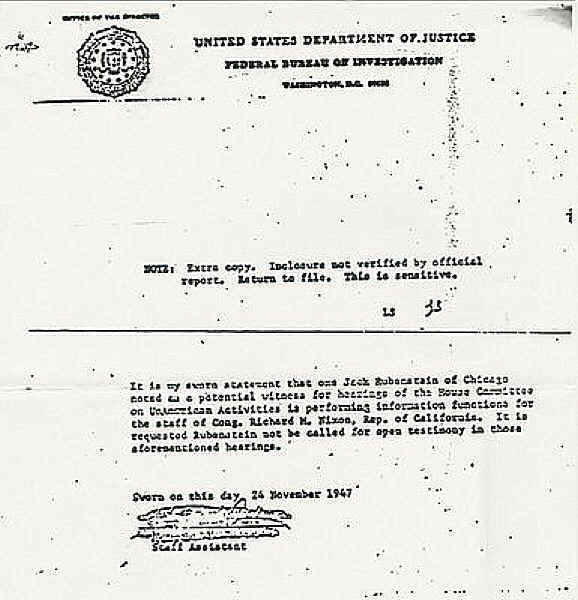
ALSO.......
Subject: Ruby-Nixon connection
From: jack white <jwjfk@flash.net>
Date: 27 Aug 1997 03:41:25 GMT
Message-id: <5u07l5$59s@chile.earthlink.net>
Researchers:
LoneNutters for several years have attempted to debunk the HUAC memo
linking
Ruby with Nixon by stating that ZIP CODES WERE NOT IN USE AT THE TIME
THE MEMO
WAS WRITTEN.
Well...today while doing some filing, I came across my copy of the memo,
and it
is very obvious that they are wrong. There IS a zip code on the copy of
the
document, BUT IT IS QUITE OBVIOUS THAT THE ZIP CODE IS ONLY ON THE
>>>FBI COVER
SHEET<<< WRITTEN AT A MUCH LATER DATE THAN THE ORIGINAL MEMO!
The one-page xerox obviously is really a composite of 2 different
documents. At
the top is a half-page undated FBI note STAPLED TO THE TOP OF A FULL
PAGE
UNDERNEATH. Only the bottom half of the full sheet is seen. The note, on
the
letterhead of the Office of the Director, is signed by LS. It does have
an illegible zip code. The cover sheet says...
QUOTE:
NOTE: Extra copy. Inclosure not verified by official
report. Return to file. This is sensitive.
Obviously, a note of transmittal has been attached years later to an
extra copy
of a document found in the HUAC files. THEN THERE IS A VERY OBVIOUS
SHADOW OF
THE EDGE OF THE HALF-PAGE COVER SHEET SLANTING ACROSS THE XEROXED PAGE
Under the shadow the LOWER HALF OF THE HUAC DOCUMENT IS SEEN.
Here is what the HUAC document says:
QUOTE:
It is my sworn statement that one Jack Rubenstein of Chicago
noted as a potential witness for hearings of the House Committee
on UnAmerican Activities is performing information functions for
the staff of Cong. Richard M. Nixon, Rep. or California. It is
requested Rubenstein not be called for open testimony in those
aforementioned hearings.
Sworn on this day 24 November 1947
SIGNATURE REDACTED
Staff Assistant
I hope this accurate assessment of this dual document debunks the zip
code myth.
If it is a fake document, the ZIP code is obviously immaterial to such a
conclusion, since it is on a transmittal cover sheet. The HUAC document
and its
FBI cover sheet seem genuine to me. On this basis, I believe Ruby was an
informant for Nixon circa 1947.
Jack White
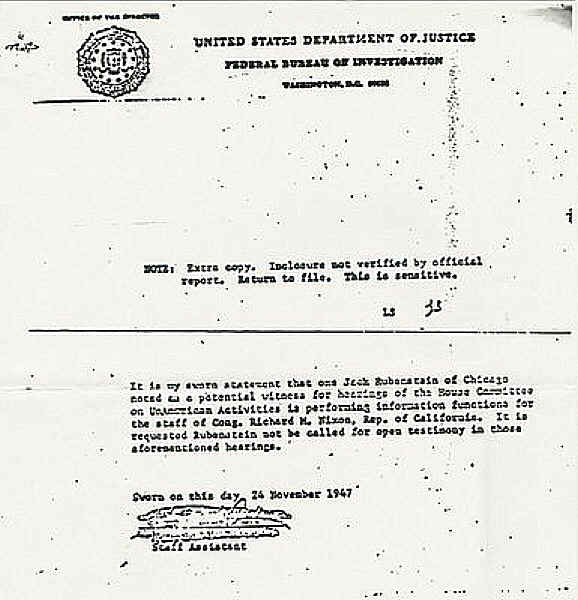
The ONLY time Ruby did NOT want to be seen all that week end was during the midnight
press conference Ruby stayed at the back of the room and, Ducked down when Oswald
was brought in. (see below)
WHY didn't Ruby want Oswald to see him?
Ruby did not want to kill Oswald.
In the wee small hours of the night he called the DPD and Warned them
"If you move Oswald we're gonna kill him.>>
http://www.youtube.com/watch?v=SCb6zfvNsh8
If Ruby Refused to kill Oswald he could have been charged as an
"Accessory Before the Fact". (Death Penalty)
Here's why>>> (below)
RUBY'S HEALTH (Below)
Ruby was a suspect in the murder of Leon Cook in Chicago.
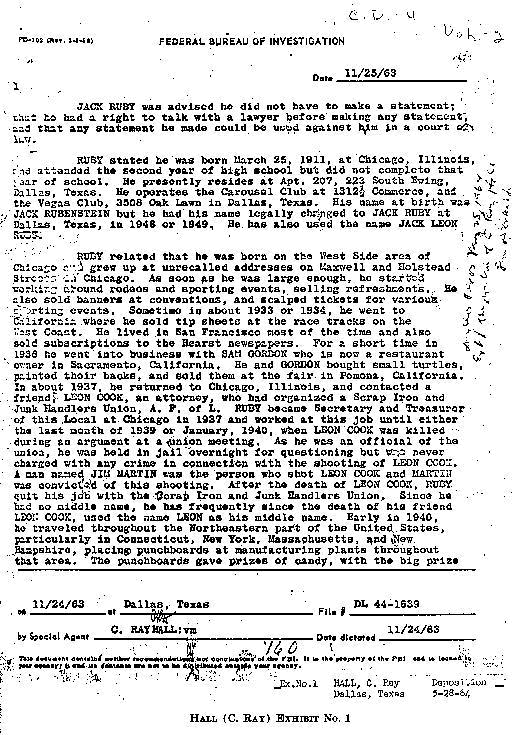
Contact Information tomnln@cox.net
Page Visited
Times


